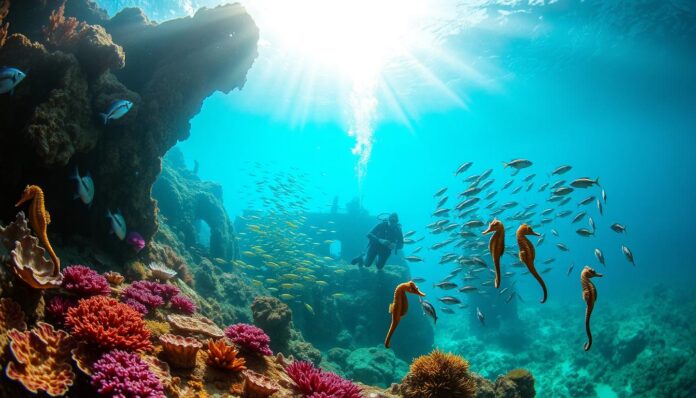| Best Time to Travel | April to October (warm water, good visibility) |
| What to Expect | Warm water (72-82°F), good visibility (up to 100 feet), diverse marine life |
| Diving Conditions | Year-round diving, but best during the summer months (warmest water, clearest visibility) |
| Marine Life | Wrecks, caves, reefs, fish, turtles, dolphins, and even the occasional whale shark |
Are you ready to find an underwater paradise with amazing adventures and clear waters? Cyprus offers the best scuba diving experience. It turns your dreams of exploring the sea into reality.
Scuba Diving in Cyprus is more than a fun activity. It opens the door to an incredible underwater world. With 54 different dive sites and 66 professional dive shops, Cyprus is perfect for all divers.
Cyprus Scuba Diving Adventures offer something special for every diver. You can dive the famous Zenobia wreck or see the colorful marine life in Ayia Napa and Protaras. Divers can explore up to 8 kilometers of beautiful underwater terrain.
Key Takeaways – Scuba Diving in Cyprus
- Year-round diving opportunities in Mediterranean climate
- Exceptional underwater visibility reaching 100 feet
- Multiple dive sites suitable for beginners and experts
- Warm sea temperatures averaging 80 degrees F in summer
- World-renowned dive locations like Zenobia Wreck
- Professional diving schools offer various certification levels
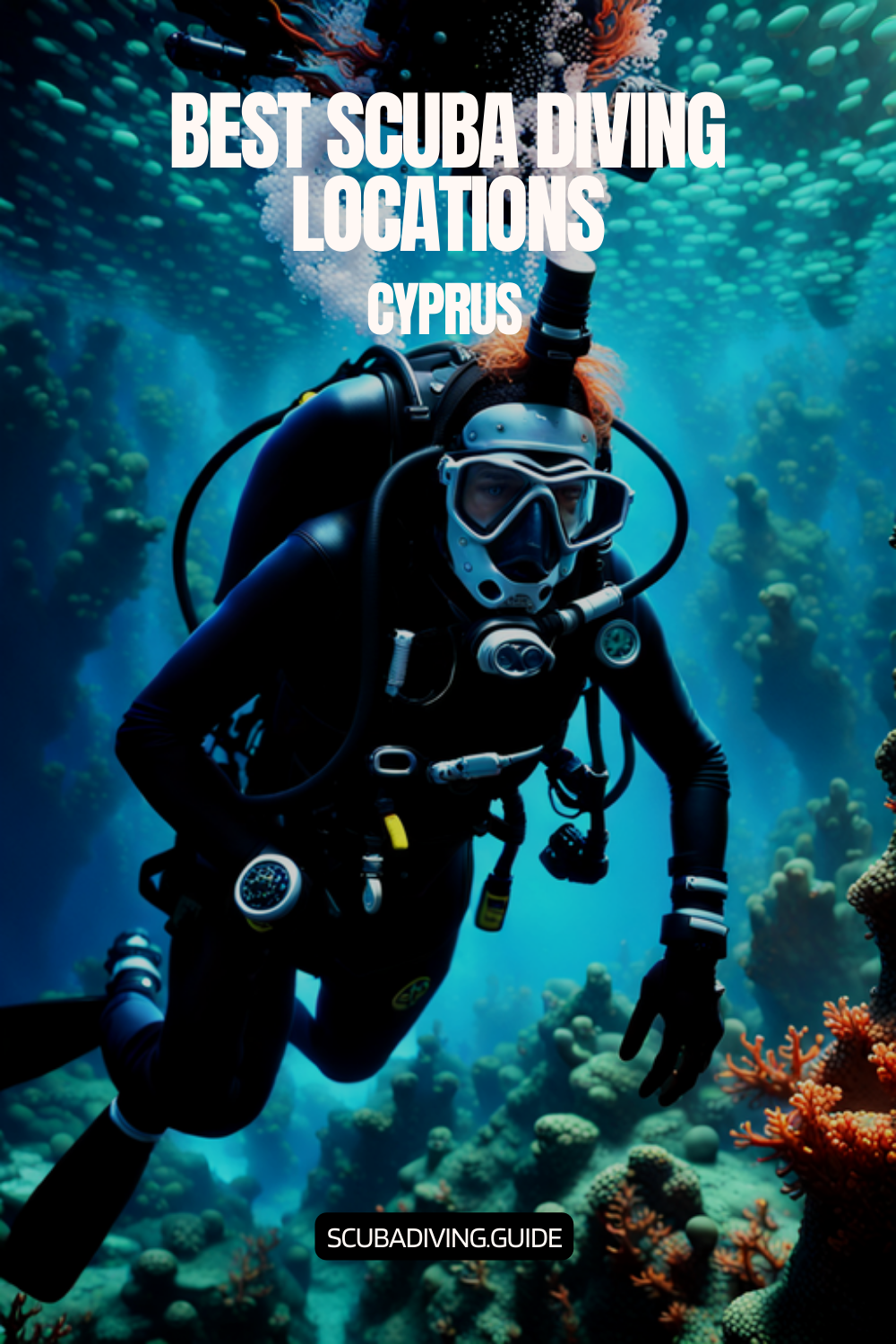
Introduction to Scuba Diving in Cyprus
Cyprus is a top spot for underwater adventures. Its location in the Mediterranean makes it a unique place for divers. The island’s waters are clear and full of life, attracting divers from everywhere.
Why Cyprus is a Top Diving Destination
Scuba diving in Cyprus is special for many reasons:
- Crystal-clear waters with exceptional visibility
- Diverse marine ecosystems
- Warm Mediterranean climate
- Rich historical underwater sites
“Cyprus offers divers a perfect blend of natural beauty and underwater exploration,” says marine expert Dr. Marina Stavrou.
Best Time of Year for Diving
The diving season in Cyprus lasts from March to November. The water is cool in February at 17°C and warm in August at 28°C. This makes it great for all divers.
| Month | Water Temperature | Diving Conditions |
|---|---|---|
| March-May | 17-22°C | Good for experienced divers |
| June-August | 24-28°C | Perfect for all skill levels |
| September-November | 22-26°C | Excellent diving conditions |
Overview of Marine Life
Divers will find an underwater paradise with many species:
- Colorful groupers
- Rainbow wrasse
- Curious moray eels
- Playful octopuses
Whether you’re new or experienced, Cyprus offers a memorable dive. It combines stunning beauty, history, and a wide variety of marine life.
Essential Equipment for Scuba Diving
Getting ready for Nicosia Scuba Diving Excursions means picking the right gear. Knowing your equipment can turn a great dive into an amazing one. It’s all about the Mediterranean waters.
Choosing the Right Wetsuit
Cyprus’s waters change from 16°C to 28°C all year. For Paphos Scuba Diving Tours, the right wetsuit is key. About 60% of divers in Cyprus choose wetsuits over dry suits because of the warm sea.
- 3mm wetsuit for summer (water over 24°C)
- 5mm wetsuit for spring and autumn (18-24°C)
- 7mm wetsuit for winter (below 18°C)
Must-Have Dive Gear and Accessories
There’s more to diving than just a wetsuit. Experts say a full set of gear is essential for safety and comfort.
| Equipment | Usage Percentage | Key Benefit |
|---|---|---|
| Mask | 100% | Reduces leak risk by 20% |
| Fins | 70% | Improves underwater movement |
| Dive Computer | 95% | Reduces decompression issues by 40% |
| BCD (Buoyancy Control Device) | 90% | Better buoyancy control by 30% |
Renting vs. Buying Equipment
Deciding between renting and buying gear is a big part of planning dives in Nicosia or Paphos.
“Invest in personal gear for comfort and reliability, for those who dive often.”
- Renting is good for those who dive less or travel a lot.
- Buying is best for those who dive a lot and want their own gear.
- Buying the basics and renting special gear is a good mix.
Remember, 90% of diving accidents are caused by human mistakes. So, good equipment and training are key for a safe dive.
Popular Dive Sites in Cyprus
Cyprus is a paradise for scuba diving lovers. It has everything from old shipwrecks to colorful sea life. Larnaca’s diving spots are perfect for all levels of divers.
The Zenobia Wreck: A World-Class Diving Destination
The Zenobia wreck is a top spot for diving in Cyprus. It sank in 1980 and is near Larnaca harbor. It’s known as one of the best wreck dives in the world.
- Depth range: 16m to 42m
- Length of wreck: 178 meters
- Visibility: Up to 20 meters
- Marine life: Groupers, barracuda, and tuna
Amphitheater Reef: An Underwater Wonderland
The Amphitheater Reef is a must-see for those who love marine life. It has a unique shape and is great for divers who are a bit more experienced.
| Dive Site | Depth Range | Difficulty |
|---|---|---|
| Amphitheater Reef | 3m – 20m | Intermediate |
Green Bay: Perfect for Beginners
Green Bay is perfect for beginners. It’s shallow and calm, making it a great place for new divers to start.
“Green Bay is a sanctuary for new divers, providing a gentle introduction to Cyprus’s underwater world.” – Local Diving Instructor
Cyprus is a unique diving spot. It offers both historic shipwrecks and vibrant sea life. It’s a place where adventure and memories are made.
Scuba Diving Schools and Certification
Exploring Cyprus’s underwater world starts with the right training and certification. Diving fans can find top-notch Cyprus Scuba Diving Certification at the island’s best diving schools.
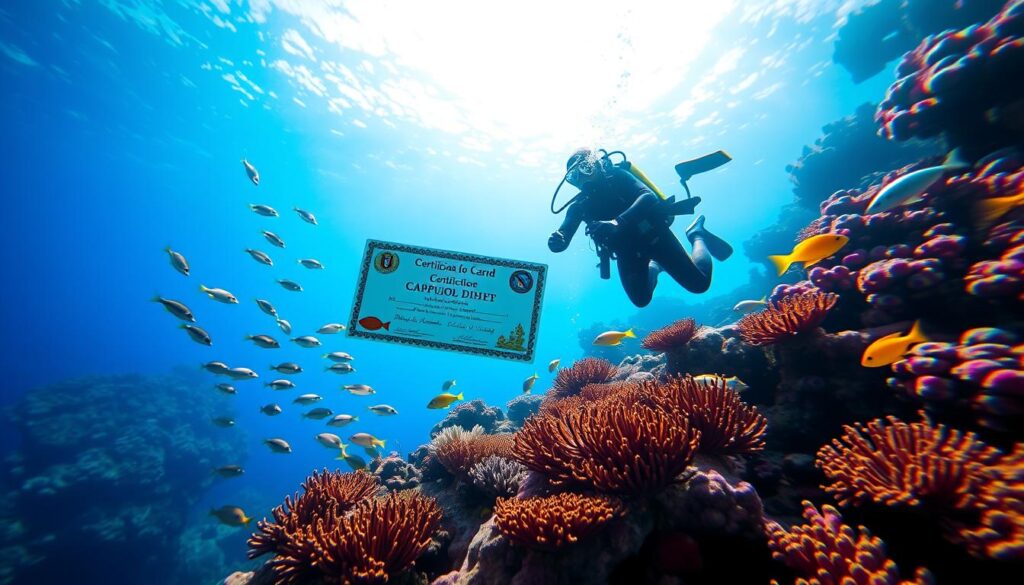
There are many options for professional training. Several famous dive centers offer programs for all skill levels.
Top Dive Schools in Cyprus
- Cydive: A pioneering dive center with 40+ years of experience
- Aquanaut Diving School: Established in 1989, located at Green Bay beach
- PADI-accredited centers with world-class instruction
Certification Levels Explained
Certifications range from beginner to advanced. They offer structured learning for underwater adventures. The Advanced Open Water (AOW) course lets divers dive up to 40 meters.
| Certification Level | Depth Limit | Cost |
|---|---|---|
| Discover Scuba | 12 meters | €185.00 |
| Open Water Diver | 18 meters | €240.00 |
| Advanced Open Water | 40 meters | €295.00 |
Course Recommendations for Beginners
For those planning Ayia Napa Scuba Diving Trips, beginners should start with introductory courses. These courses offer safety training and hands-on experience. Most dive schools provide:
- Swimming pool training sessions
- Classroom theory lessons
- Supervised open water dives
“Safety and proper training are the foundations of an incredible diving experience.” – PADI Professional Instructor
Pro tip: Choose a dive school with experienced instructors and modern facilities for the best learning experience.
Safety Tips for Scuba Diving
Safety is key for a great Cyprus Scuba Diving Adventure. Divers know that being prepared and knowing what to do can make diving safe and fun. It’s important to follow safety rules closely when diving in Cyprus.
Pre-Dive Safety Checks
Before diving, it’s vital to check your gear. Most dive accidents happen because of mistakes, so checking your equipment is a must.
- Inspect regulator functionality
- Check air tank pressure
- Verify buoyancy control device (BCD) operations
- Test mask and fin integrity
Essential Dive Signals
Good communication underwater is key. Divers need to know important hand signals to stay safe with their buddy and group.
- OK Sign: Thumb and index finger forming a circle
- Problem Signal: Hand moving side to side
- Low Air: Thumb and pinky extended
Dealing with Emergency Situations
“In diving, knowledge is your most reliable lifeline.” – Professional Diving Expert
Being ready for emergencies is important in Cyprus Scuba Diving. Always have emergency numbers and diving insurance. Remember the local emergency number 112.
| Emergency Preparedness | Key Actions |
|---|---|
| First Aid Kit | Carry complete marine first aid supplies |
| Emergency Contacts | Local dive centers, hyperbaric chambers, medical facilities |
| Insurance Coverage | Diving-specific medical and evacuation protection |
By sticking to these safety tips, divers can enjoy their time underwater in Cyprus without worry.
Planning Your Dive Trip
Exploring the underwater world in Cyprus is an amazing adventure for diving fans. The island has clear waters and stunning marine views. It’s a top spot for scuba diving.
Best Locations for Diverse Experiences
Cyprus has many great places for diving. You can find:
- Paphos: Offers varied diving experiences from shore to wreck dives
- Ayia Napa: Known for beautiful wreck and shore diving opportunities
- Latchi: Features stunning diving sites within Akamas National Park
- Protaras: Provides multiple shore and wreck dive options
How to Arrange Dive Packages
Booking dive packages in Nicosia is easy through local dive centers. Here are some tips:
- Research reputable dive operators online
- Check certification requirements
- Book packages in advance during peak season (May-October)
- Verify included equipment and safety protocols
Accommodations Near Dive Sites
Choosing the right place to stay makes your dive trip better. Larnaca and Paphos are close to great diving spots. The water is warm, from 22°C to 28°C, during the best diving months.
“Cyprus offers diving experiences that transform underwater exploration into an extraordinary journey.” – Mediterranean Diving Magazine
There are many places to stay near dive sites, from cheap hostels to fancy resorts. Pick a place that’s close to where you want to dive.
Underwater Photography Tips
Capturing the magical underwater world of Cyprus needs special skills and gear. Paphos Scuba Diving Tours offer great chances for photographers. They can document their marine adventures, like Cyprus Wreck Diving Experiences.
Gear Recommendations for Photographers
Choosing the right underwater photography equipment is key. Here are some must-haves:
- Waterproof camera housing with depth rating
- Wide-angle lens for expansive marine scenes
- Strobes or underwater lighting systems
- Compact digital camera with manual settings
Techniques for Capturing Marine Life
Underwater photography requires special techniques. Here are some important ones:
- Maintain optimal camera settings:
- ISO: 125 at 20 meters depth
- Shutter speed: Minimum 1/125th second
- Aperture: Around 4.5
- Focus on composition within first 15 meters
- Understand color loss at deeper depths
“Great underwater photography is about patience and understanding marine environments.” – Professional Underwater Photographer
Editing Your Underwater Photos
Editing can make your underwater images even better. Color correction is key because underwater colors fade. Use photo editing software for precise color and contrast adjustments.
For those on Paphos Scuba Diving Tours, the PADI Underwater Photography course (€255.00) is a great choice. It includes two open water dives and expert guidance on capturing marine life.
Scuba Diving for Beginners
Starting your first scuba diving adventure in Cyprus can be thrilling and a bit scary. The stunning Larnaca Scuba Diving Spots are great for beginners. They offer a perfect chance to explore the underwater world.
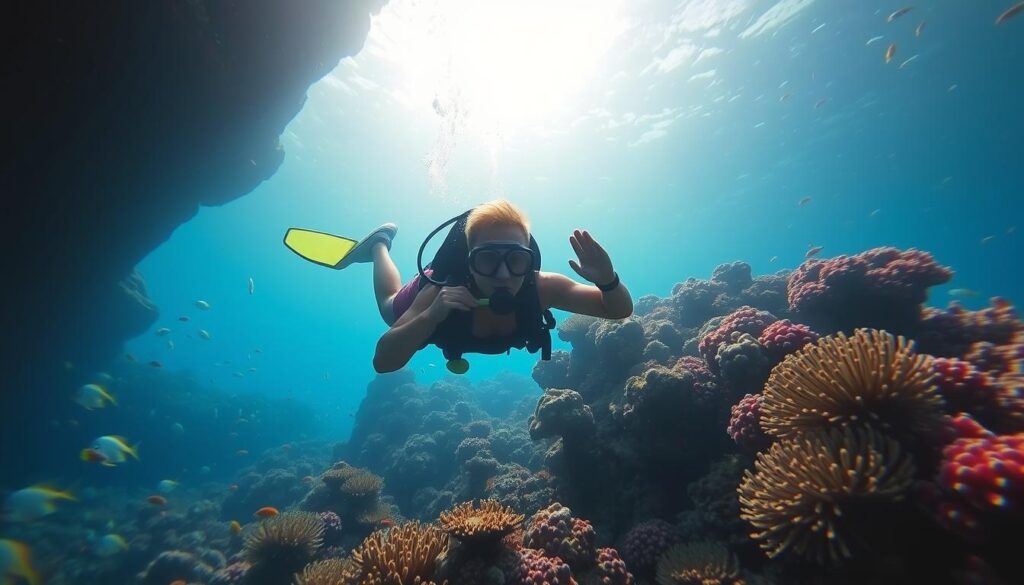
First Dive: What to Expect
Your first dive will be structured to keep you safe and help you feel confident. The Discover Scuba Diving program is a great way for beginners to start:
- Duration: 3-4 hours total experience
- Cost: €80 for the trial program
- Maximum depth: 12 meters
- Number of dives: 1 confined water and 1 open water dive
Guided vs. Solo Diving
For beginners, guided diving is strongly recommended. Cyprus Scuba Diving Certification programs offer professional instruction and support. Guides help you:
- Navigate underwater environments safely
- Understand marine life interactions
- Learn proper diving techniques
- Build confidence in underwater skills
“The ocean is a classroom, and every dive is a lesson in adventure and respect for nature.” – Local Diving Instructor
Overcoming Common Fears
Many new divers feel anxious about diving. To manage these fears, try:
- Taking thorough training courses
- Practicing breathing techniques
- Starting in shallow, calm waters
- Communicating openly with your instructor
With the right preparation and guidance, your first dive in Cyprus can be amazing. Remember, every expert diver was once a beginner!
Protecting the Underwater Environment
Coral Reefs in Cyprus are delicate and full of life. They need our care and respect. Scuba diving fans are key in keeping these underwater wonders safe, during trips in Ayia Napa.
Importance of Marine Conservation
Cyprus is home to a lot of marine life, including endangered species. Sea turtles, like loggerheads and greens, live here. To protect them, Marine Protected Areas (MPAs) have been set up.
- Protect endangered marine species
- Preserve unique underwater habitats
- Support local ecological balance
Eco-Friendly Diving Practices
Responsible diving helps keep the ocean clean. Hands-off practices are key for protecting marine life during dives in Cyprus.
| Practice | Environmental Benefit |
|---|---|
| Avoid touching marine life | Prevents stress and harm to organisms |
| Use reef-safe sunscreen | Reduces chemical damage to coral ecosystems |
| Maintain proper buoyancy | Prevents accidental coral reef damage |
Participating in Conservation Efforts
Divers can help with marine conservation through citizen science projects. These projects let divers collect data during Ayia Napa Scuba Diving Trips. This data helps research on marine habitats.
“Every dive is an opportunity to protect and understand our marine environment.” – Marine Conservation Expert
- Join beach and underwater clean-up events
- Participate in marine species surveys
- Support local conservation organizations
By following these practices, divers help protect Cyprus’s underwater world. They make sure it stays safe for future generations.
Fun Activities Beyond Diving
Cyprus has more than just underwater fun for those seeking adventure. On Paphos Scuba Diving Tours, you can explore coastal attractions and cultural experiences. These add to the excitement of your marine adventures.
Snorkeling Spots for Non-Divers
Not everyone dives, but Cyprus has great snorkeling spots. The island’s clear waters are perfect for seeing marine life from the surface.
- Green Bay near Paphos: Ideal for beginners
- Coral Bay: Shallow waters with vibrant marine life
- Cape Greco National Forest Park: Stunning underwater landscapes
Exploring Cyprus’s Coastal Attractions
Cyprus’s coastline offers amazing experiences. You can enjoy beautiful beaches, quaint seaside towns, and stunning Mediterranean views.
- Relaxing on golden sandy beaches
- Waterfront dining experiences
- Coastal walking and hiking trails
Cultural Highlights Near Dive Sites
Paphos Scuba Diving Tours offer more than just diving. Nearby, you can find archaeological sites and historical landmarks. They add depth to your underwater adventures.
“Cyprus is where history meets adventure, both above and below the water.”
Must-see cultural sites include the Paphos Archaeological Park, ancient Roman villas, and medieval castles. They show the island’s rich history.
Frequently Asked Questions (FAQs)
Planning your Scuba Diving in Cyprus adventure can raise many questions. This FAQ section will cover the most common concerns. It aims to provide essential insights for divers of all experience levels.
Common Concerns About Diving in Cyprus
Divers often ask about Cyprus Scuba Diving Certification and local diving conditions. The island offers great underwater experiences. You’ll find remarkable visibility and diverse marine environments.
- Typical water depths range from 30-60 feet (9-18 m)
- Recommended dive certification for beginners
- Safety protocols specific to Cyprus waters
What to Know Before Your First Dive
First-time divers need to know some key things. PADI certification is the most recognized credential. Courses usually take around 3 days to complete.
Potential divers must show they can swim:
- Swim 200 meters non-stop
- 10-minute water tread/float
- Comfortable with mask and snorkel
Local Regulations and Guidelines
Cyprus has specific diving regulations for safety and marine ecosystem protection. It’s important to understand these guidelines for a successful dive.
| Age Requirement | Diving Restrictions |
|---|---|
| 10-11 years old | Must dive with certified parent/guardian |
| 12-14 years old | Must dive with certified adult |
| 15+ years old | Can obtain full Open Water Certification |
“Preparation and knowledge are the keys to an unforgettable underwater adventure in Cyprus.”
Practical tips for divers include bringing cash for smaller establishments. Make sure your certification is current. Most dive operators require proof of diving activity within the past six months.
Remember, your Cyprus Scuba Diving Certification is valid for life. But, staying current with skills and local regulations ensures a safe and enjoyable experience.
Cyprus Recommended Scuba Diving Itinerary
Planning a scuba diving trip to Cyprus? With its abundance of dive sites and diverse underwater landscapes, creating a well-rounded itinerary will ensure you make the most of your diving adventure. Here’s a recommended scuba diving itinerary that encompasses some of the best dive sites the island has to offer:
Day 1: Arrival and Orientation
Upon arrival in Cyprus, settle into your accommodation and visit a local diving center to familiarize yourself with the diving facilities and services available. Take this opportunity to meet the staff, discuss your diving goals, and arrange any necessary equipment rental or courses.
Day 2: Dive the Zenobia Wreck
Start your diving journey with one of Cyprus’s most famous and iconic dive sites, the Zenobia wreck. Located off the coast of Larnaca, this massive roll-on/roll-off ferry offers an extraordinary wreck diving experience. Explore the various levels of the wreck, swim through its corridors, and witness the marine life that has made it their home. This dive is a must for wreck diving enthusiasts.
Day 3: Akrotiri Peninsula
Head to the Akrotiri Peninsula on the southwestern coast of Cyprus. Dive into the intriguing underwater caves and explore the captivating rock formations in this area. Keep an eye out for colorful corals, groupers, octopuses, and other marine life that inhabit these sites. The Akrotiri Peninsula offers a range of dive sites suitable for different skill levels, making it an excellent location for divers of all experience levels.
Day 4: Cape Greco Marine Park
Venture to Cape Greco, a marine protected area on the southeastern coast of Cyprus. Dive into the crystal-clear waters and discover the rich marine biodiversity this area has to offer. Swim among moray eels, damselfish, wrasses, and other fascinating marine species. Don’t miss the chance to explore the underwater caves and swim-through tunnels, which add an extra element of adventure to your dive.
Day 5: Green Bay and St. George’s Island
Begin the day with a dive in Green Bay, near Protaras. This calm and shallow dive site is perfect for beginners and underwater photography enthusiasts. Immerse yourself in the vibrant marine ecosystem, encountering colorful fish, sea anemones, and coral formations.
In the afternoon, head to St. George’s Island, situated off the coast of Paphos. Dive into the depths and explore the dramatic underwater topography, including swim-throughs, tunnels, and caves. Encounter sea turtles, groupers, and shoals of fish as you navigate through this captivating dive site.
Day 6: Amphitheatre and Blue Lagoon
Embark on a dive at the Amphitheatre near Paphos. Descend into this natural circular formation and discover the diverse marine life that calls it home. Keep an eye out for barracudas, sea bream, and octopuses as you explore the rocky formations and descending tiers of this unique dive site.
In the afternoon, visit the Blue Lagoon near the Akamas Peninsula. This shallow dive site is perfect for beginners and snorkelers. Enjoy the crystal-clear turquoise waters and swim alongside colorful fish, experiencing the beauty of the vibrant marine ecosystem.
Day 7: Choose Your Own Adventure
On your final day, choose from the remaining dive sites based on your preferences and skill level. Consider options such as the underwater caves in Ayia Napa, the wall dive at Manijin Island, or the intriguing Pyramid dive site off the coast of Limassol. Discuss with local diving experts and select a site that suits your interests and provides a memorable finale to your scuba diving itinerary.
Remember to adhere to safe diving practices, including dive planning, monitoring air consumption, and following the guidance of your dive guide or instructor. Always prioritize your safety and enjoy the wonders that Cyprus’s underwater world has to offer.
By following this recommended scuba diving itinerary, you’ll have the opportunity to explore a diverse range of dive sites, encounter captivating marine life, and create lasting memories of your diving experience in Cyprus.
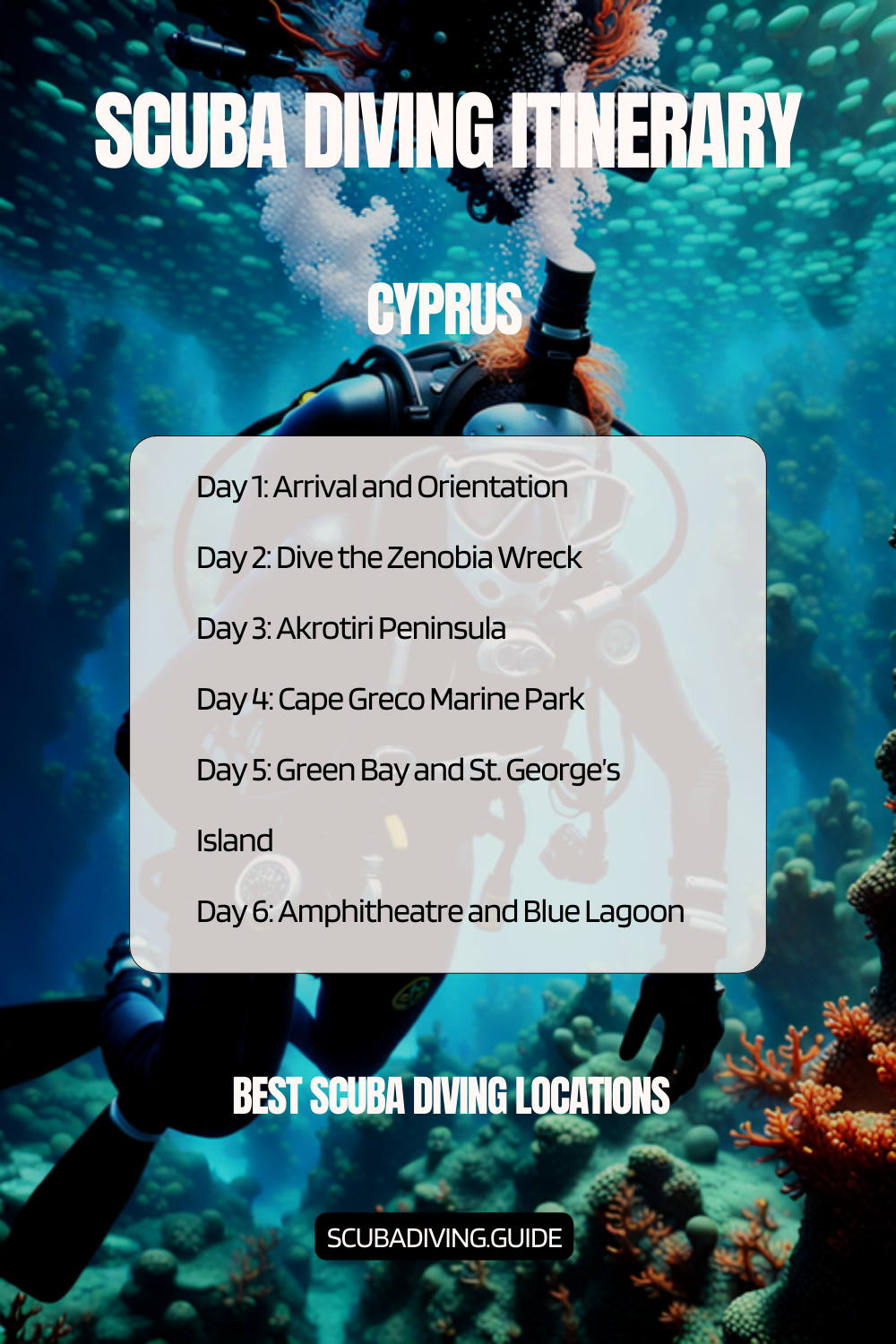
Other Countries to Consider
Conclusion: Your Next Adventure Awaits
Cyprus Scuba Diving Adventures offer an unmatched underwater journey. You’ll find excitement, discovery, and stunning marine encounters. From the famous Zenobia wreck to vibrant marine ecosystems, Cyprus is a paradise for divers.
Your dive in Cyprus is more than just a trip. You’ll see colorful marine life like octopuses, cuttlefish, and parrotfish. Each dive site is a chance to see Cyprus’s underwater world in all its beauty.
Getting ready and staying safe is important for a great dive. Dive centers like Pissouri Bay Divers offer top-notch PADI courses and expert advice. Whether you’re new to diving or have lots of experience, Cyprus is the perfect place for an unforgettable dive.
When you plan your next dive, remember Cyprus is more than a place. It’s a doorway to an amazing underwater world. Dive in, explore with care, and make memories that will last forever.
Key Takeaways
Diving in Cyprus offers unique experiences for all skill levels. The marine ecosystems are rich and diverse, ready to be explored.
Your Diving Journey Begins
Start planning your Cyprus scuba adventure today. With professional dive centers, incredible marine life, and stunning underwater landscapes, your next great exploration is just a dive away.
Resources for Further Research
Explore official Cyprus tourism websites, contact local dive centers like Pissouri Bay Divers, and connect with marine conservation organizations. Plan your ultimate underwater adventure.
FAQ – Scuba Diving in Cyprus
What is the best time of year to go scuba diving in Cyprus?
Cyprus is great for diving from March to November. The water is warmest in late summer, reaching up to 27°C. June to September is the best time for clear water and lots of marine life.
Do I need a certification to dive in Cyprus?
Most dives need a PADI, SSI, or NAUI certification. Beginners can get certified at dive schools in Ayia Napa and Larnaca.
What marine life can I expect to see while diving in Cyprus?
Cyprus has a rich underwater world. You might see groupers, rainbow wrasse, and octopuses. The Zenobia wreck is famous for its marine life and formations.
Is it better to rent or buy scuba diving equipment?
Renting is easier and cheaper for occasional divers. Dive centers in Cyprus have good rental gear. But, buying your own gear is better for frequent divers. Make sure rented gear is safe and well-maintained.
What are the top dive sites in Cyprus?
Cyprus has amazing dive sites. The Zenobia Wreck is a top wreck dive. Amphitheater Reef – Green Bay is great for beginners. Paphos and Ayia Napa also have great dive spots.
What safety precautions should I take while diving in Cyprus?
Always dive with a buddy and check your gear before diving. Follow your instructor’s advice and use dive insurance. Know your limits and dive within your certification level. Learn underwater signals.
How can I contribute to marine conservation while diving?
Help marine conservation by diving eco-friendly. Don’t touch marine life and join clean-up activities. Support local conservation groups and use reef-safe sunscreen. Minimize underwater disturbance.
What should I do if I’m a first-time diver?
First-time divers should take an introductory course. Start with guided dives and choose beginner-friendly spots. Listen to your instructor and practice breathing. Don’t hesitate to ask questions. Consider a PADI Open Water certification course.
What additional activities can I do in Cyprus beside diving?
Cyprus has lots to do. Try snorkeling, explore beaches, and visit cultural sites. Enjoy water sports and try local food. Many dive packages include tours of both underwater and land attractions.
